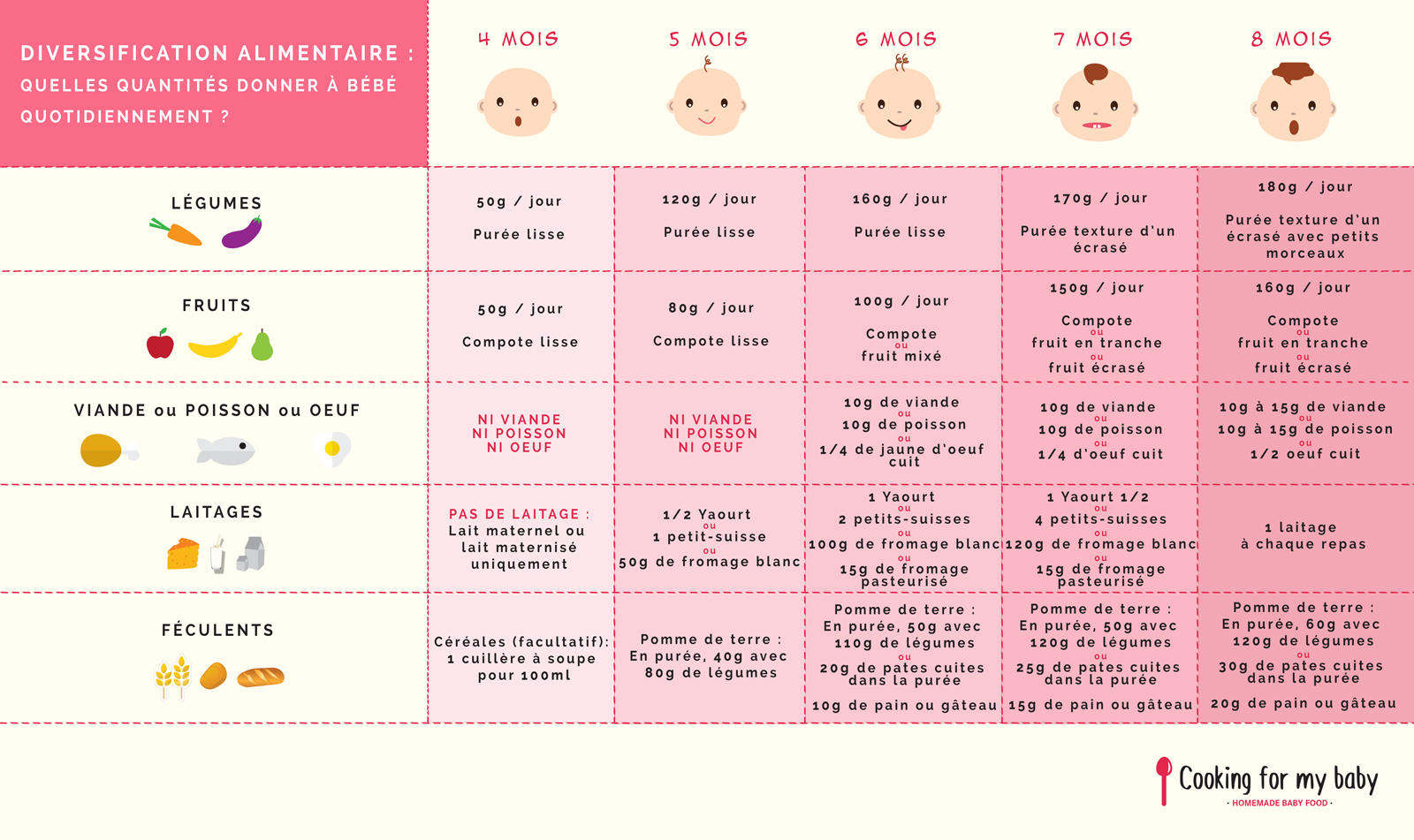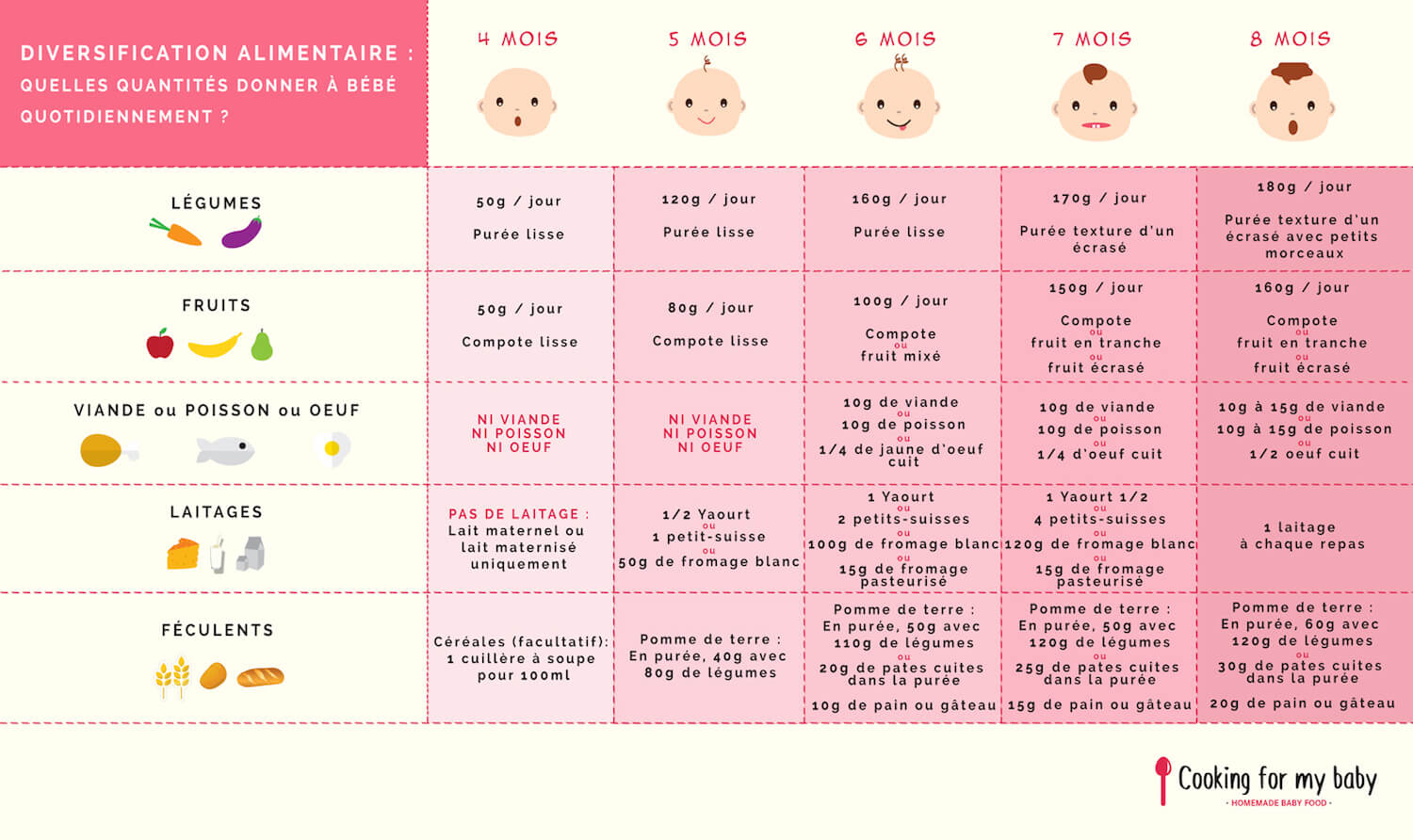When it’s time to introduce solid foods to your baby, you may wonder what vegetables and fruits to offer and in what quantities. As your baby grows, their dietary needs evolve too. Wouldn’t it be great to have a handy food introduction chart?
Baby Food Introduction
Quick Access:
- Food Introduction Chart
- What is Baby Food Introduction?
- How to Start Baby Food Introduction?
- What Foods to Give Baby Based on Age?
- In Conclusion
Food Introduction Chart
As a busy parent, I’ve done my fair share of research on what foods to give to my baby and in what quantities. So, I’ve gathered all my findings and prepared a practical baby food introduction chart with recommended daily serving sizes from 4 to 8 months.
Why only up to 8 months? Every baby progresses differently. They don’t all have the same size, weight, developmental pace, or dietary requirements.
Here’s the baby food introduction chart listing the recommended quantities and proportions for each month, from 4 to 8 months. The chart includes:
- Vegetables
- Fruits
- Animal proteins (Meat, fish, or egg – for more information on introducing meats, click here)
- Dairy products
- Starchy foods

Remember to trust your baby, follow their cues, and listen to your instincts. You and your little one make the best team, so never doubt it.
It’s important to start baby food introduction with the approval of your pediatrician. They will consider your baby’s growth and adjust the timing accordingly. Some babies with gastroesophageal reflux (GERD) may even begin food introduction as early as 3 months!
What is Baby Food Introduction?
Baby food introduction is the exciting stage when we introduce solid foods into the baby’s diet. Their taste buds awaken, and new flavors and textures are explored!
From the start of food introduction, milk bottles or breastfeeding are no longer the sole source of nutrition. New tastes and textures become available to your baby. Texture plays a significant role during this stage of food introduction as it’s part of the magical discoveries in your baby’s feeding journey.
Typically, we begin baby food introduction between 4 and 6 months (to minimize the risk of food allergies, allergists recommend not starting after 6 months).
While baby food introduction can be stressful for parents, it’s a delightful experience for babies, and they can’t get enough! This stage becomes a pleasure for parents as well, creating precious moments of sharing.
How to Start Baby Food Introduction?
Regardless, it’s essential to proceed gently. Just because you’re starting food introduction at 5 months doesn’t mean you have to give your baby the exact quantities mentioned for a 5-month-old in the food introduction chart all at once, every day. Start with small amounts, similar to a 4-month-old, so your baby can gradually adapt to their new diet. (Click here to learn how to start baby food introduction).
How to Begin Baby Food Introduction?
Feel free to explore the articles I’ve written to guide you better.
Among the first baby purees, you’ll find:
- The first carrot puree
- The first spinach puree Zucchini and potato puree
- Simple beetroot puree
And among the first fruit compotes:
- Apricot and apple compote
- Pear and banana compote
For the first purees and compotes, if you prepare them in larger quantities, I recommend storing the excess in ice cube trays in the freezer (covered with cling film).
This way, you can defrost what you need by gradually increasing the number of puree or compote cubes for each meal as your baby’s dietary needs evolve during the food introduction journey. (Click here to learn more about storage techniques).
What Foods to Give Baby Based on Age During Food Introduction?
Not all foods can be given to babies right from the start of food introduction. It’s important to follow specific recommendations and gradually introduce foods based on their digestibility, acidity, and potential allergenic properties. Click here to learn when to give certain fruits or vegetables to your baby.
(Note that your pediatrician is the best person to guide you through your baby’s food introduction journey. If they believe that all foods can be introduced right from the start, trust their recommendations as they are tailored to your baby! ;))
Conclusion
In conclusion, baby food introduction is a significant milestone that shouldn’t be taken lightly. It involves the introduction of solid food, and babies need time to adjust to this new mode of feeding. If you have any questions or concerns regarding your baby’s food introduction, always consult your pediatrician.
If you feel that your baby isn’t ready for solid food, it’s important not to push it. You may hear other parents saying, ‘My baby started food introduction, and they eat so well!’ However, every child is different, and it’s best to adapt to their pace and proceed gently.
The recommended serving sizes provided above are just guidelines, as every baby is unique. Never force your baby to finish their puree, for example, as you don’t want them to have a stomach upset or develop an aversion to it in the future.
Breast milk or infant formula should remain the main source of nutrition for your baby. Follow the recommended quantities based on their age. Feel free to discuss these quantities with your pediatrician.

- [adinserter block="11"]















4 comments
Is there an english version for the pages? I vould only find your blog in french for example: https://www.cookingformybaby.com/en/solid-foods-how-much-your-baby-should-be-eating-everyday-chart/
I need the chart to be English please…
English please!
Hello, are these quantities daily? 160g veggies. 110g fruit/ day for a 6 month old?
Your baby may also like
What quantity of milk does a baby need per day?
08/14/2017Baby food storage : Refrigerator, Freezer, equipment…
12/17/2016Meat for baby: Age, Quantities, Type of meats…
10/30/2017When and how to start solids for babies?
08/15/2016How to start solid foods for babies? (30-day schedule)
10/19/2016Let’s start solid food introduction!
08/03/2016At what age ‘should we’ eliminate the evening bottle for our baby?
05/06/2019How to dress baby for sleep at night? (Depending on the temperature of the room)
06/13/2017The Equipment I Use for Preparing Baby Meals
08/20/2016Dairy products for babies: Yogurt, Petit-Suisse, Cheese… What to Give?
09/15/2016